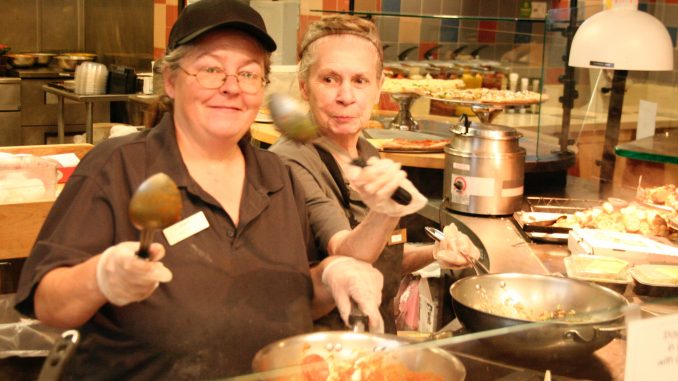
A total elimination of cafeteria workers in SUNY Orange’s food services department will likely not be reflected in any way at SUNY New Paltz.
The Times Herald-Record reported that a total of nine full-time and three part-time workers from both Middletown and Newburgh campuses will be fired according to an email sent out to students by Executive Director of the Orange County Community College Association Vinnie Cazzetta. Cazzetta wrote that the decision was made in order to combat a $150,000 deficit seen in food-service operations.
Cazzetta also told reporters that if these changes were not made they would not have been able to make payroll.
“We could have been out of business in 12 to 18 months,” Cazzetta said.
Similar concerns about employees being replaced were expressed by students two years ago when the Backstage Café in Parker Theater was set to close and reopen as Starbucks. However, Campus Auxiliary Services (CAS) Executive Director Steven Deutsch stated that the kinds of food services provided on campus would not be replicable by a vending machine.
“If I were to put in 100, 500, 1,000 vending machines, if we could replicate the quantity of what needs to be delivered, the quality wouldn’t be there,” he said. “People wouldn’t be able to get healthy food, vegan food, hot food. It’s a model that couldn’t possibly work for us.”
This notion was reflected by Starbucks employee Kellie Decker, who claimed that a vending machine would only be able to provide simple cups of coffee as opposed to more intricate drinks made by people.
Deutsch also said that a single food operator such as The Roost at Ridgeview could theoretically become an automat, a food service establishment that services foods and drinks entirely by vending machines. However, the machines would still need to be managed by food service employees, albeit fewer than current operations require.
“If that was somehow a benefit to the campus in some way we would do it,” he said. “I can’t really see that being a benefit to the campus, but I’d be willing to play around with the idea.”
Deutsch stated that the one real benefit to vending machines are their ability to remain open 24/7, citing Shop24 as a prime example. He said that while sales are quite good when it is operational, it has required quite a bit of human effort to keep it that way, and that it does not replace the food service program, especially given the amount of money the college makes on 3,100 students paying for meal plans. Instead, vending machines serve as a supplement to the food services provided on campus.
“I’m open-minded. I’m willing to look at anything that improves what we do for students,” Deutsch said. “But I can’t currently see anything that’s happening at SUNY Orange really being down here.”
